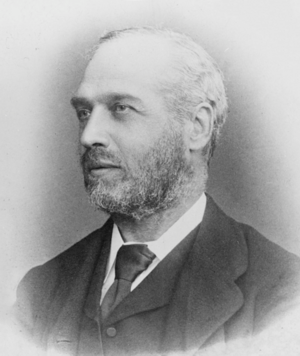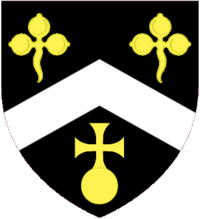George Shaw Lefevre, 1st Baron Eversley facts for kids
Quick facts for kids
The Lord Eversley
PC DL
|
|
|---|---|
 |
|
| First Commissioner of Works | |
| In office 29 November 1881 – 13 February 1885 |
|
| Monarch | Victoria |
| Prime Minister | William Ewart Gladstone |
| Preceded by | William Patrick Adam |
| Succeeded by | The Earl of Rosebery |
| In office 18 August 1892 – 10 March 1894 |
|
| Monarch | Victoria |
| Prime Minister | William Ewart Gladstone |
| Preceded by | Hon. David Plunket |
| Succeeded by | Herbert Gladstone |
| Postmaster General | |
| In office 7 November 1884 – 9 June 1885 |
|
| Monarch | Victoria |
| Prime Minister | William Ewart Gladstone |
| Preceded by | Henry Fawcett |
| Succeeded by | Lord John Manners |
| President of the Local Government Board | |
| In office 1894 – 21 June 1895 |
|
| Monarch | Victoria |
| Prime Minister | The Earl of Rosebery |
| Preceded by | Henry Fowler |
| Succeeded by | Henry Chaplin |
| Personal details | |
| Born | 12 June 1831 Battersea |
| Died | 19 April 1928 (aged 96) Kings Worthy, Hampshire |
| Nationality | British |
| Political party | Liberal Party |
| Spouse | Lady Constance Reynolds-Moreton (d. 1929) |
| Alma mater | Trinity College, Cambridge |
George John Shaw Lefevre, 1st Baron Eversley (born June 12, 1831 – died April 19, 1928) was an important British politician. He was a member of the Liberal Party. He worked in government for thirty years. During this time, he held several important jobs. He was in charge of public buildings twice as the First Commissioner of Works. He also managed the postal service as Postmaster General. And he oversaw local government as President of the Local Government Board.
Contents
Early Life and Education
George Shaw Lefevre was born in Battersea, England. His father was Sir John Shaw Lefevre. George was the only son in his family. His uncle, Charles Shaw-Lefevre, was a very important person. He was the Speaker of the House of Commons.
George went to two famous schools. First, he studied at Eton. Then, he went to Trinity College, Cambridge. After finishing his studies, he became a lawyer in 1855. This meant he could argue cases in court.
Starting His Political Journey
George Shaw Lefevre first tried to become a Member of Parliament (MP) in 1859. He ran for the Liberal Party in Winchester but did not win. However, he succeeded in 1863. He was elected to represent Reading in the House of Commons. He held this seat until 1885.
His very first speech in Parliament was about the Alabama incident. This was a dispute between Britain and the United States. In 1868, he helped push for a peaceful solution to the "Alabama Claims." These claims were about ships built in Britain that helped the South during the American Civil War.
George held several government jobs early in his career. In 1866, he worked for the Royal Navy. From 1868 to 1871, he helped with trade matters. He also worked for the Home Department for a short time in 1871. Later, he helped manage the Royal Navy again from 1871 to 1874, and once more in 1880. He became a member of the Privy Council. This is a group of important advisors to the King or Queen. In 1882, he became a "Bencher" at the Inner Temple. This is a special honor for experienced lawyers.
Important Government Roles
In 1881, George Shaw Lefevre became the First Commissioner of Works. This job meant he was in charge of all public buildings and parks. He held this role until 1885. In November 1884, he joined the Prime Minister William Gladstone's main team of ministers, called the Cabinet. He was appointed Postmaster General. This meant he was responsible for the country's postal service.
He left his job as First Commissioner of Works in February 1885. He continued as Postmaster General until the Liberal Party lost power in June 1885. He lost his own seat in Parliament in the 1885 general election. This meant he was not in Parliament for a short time.
However, he returned to the House of Commons in April 1886. He won a special election for the Bradford Central area. He represented this area until 1895.
In 1892, he became First Commissioner of Works again. He also rejoined the Cabinet under Prime Minister Gladstone. When Lord Rosebery became Prime Minister in 1894, George was given a new job. He became President of the Local Government Board. This role involved overseeing local councils and public health. He stayed in this job until 1895, when the Liberal Party lost power again.
In 1897, he was elected to the London County Council. This council managed local affairs for London. In 1906, he received a special honor. He was given the title of Baron Eversley. This meant he became a "peer" and could sit in the House of Lords. This was a revival of a title his uncle had held. He gave his last speech in the House of Lords in 1913.
Other Contributions
George Shaw Lefevre also held other important public roles. In 1858, he helped negotiate a fishing agreement with the French government. He was part of a commission on sea fisheries in 1862. From 1878 to 1879, he was the President of the Statistical Society of London.
He also led two important Royal Commissions. These were special groups set up to investigate important issues. In 1885, he led a commission on the loss of life at sea. From 1893 to 1896, he led a commission looking into problems in farming.
In 1865, he helped start the Commons Preservation Society. This group worked to protect open spaces and common land. He was its first chairman and later its president. In 1899, he was elected a Fellow of the Royal Society. This is a very high honor for scientists and people who have made important contributions to knowledge.
Family Life
George married Lady Constance Moreton in 1874. They did not have any children. He passed away in April 1928, at the age of 96. Because he had no children, his title of Baron Eversley ended when he died. He is buried in the churchyard at St Mary's Church, King's Worthy. Lady Eversley died a year later in February 1929.
George had two sisters. One sister, Madeleine, became the first leader of Somerville Hall. This was one of the first colleges for women at Oxford University. His other sister, Rachel, married Arthur Hamilton-Gordon. He was the son of a former Prime Minister.
Arms
|



